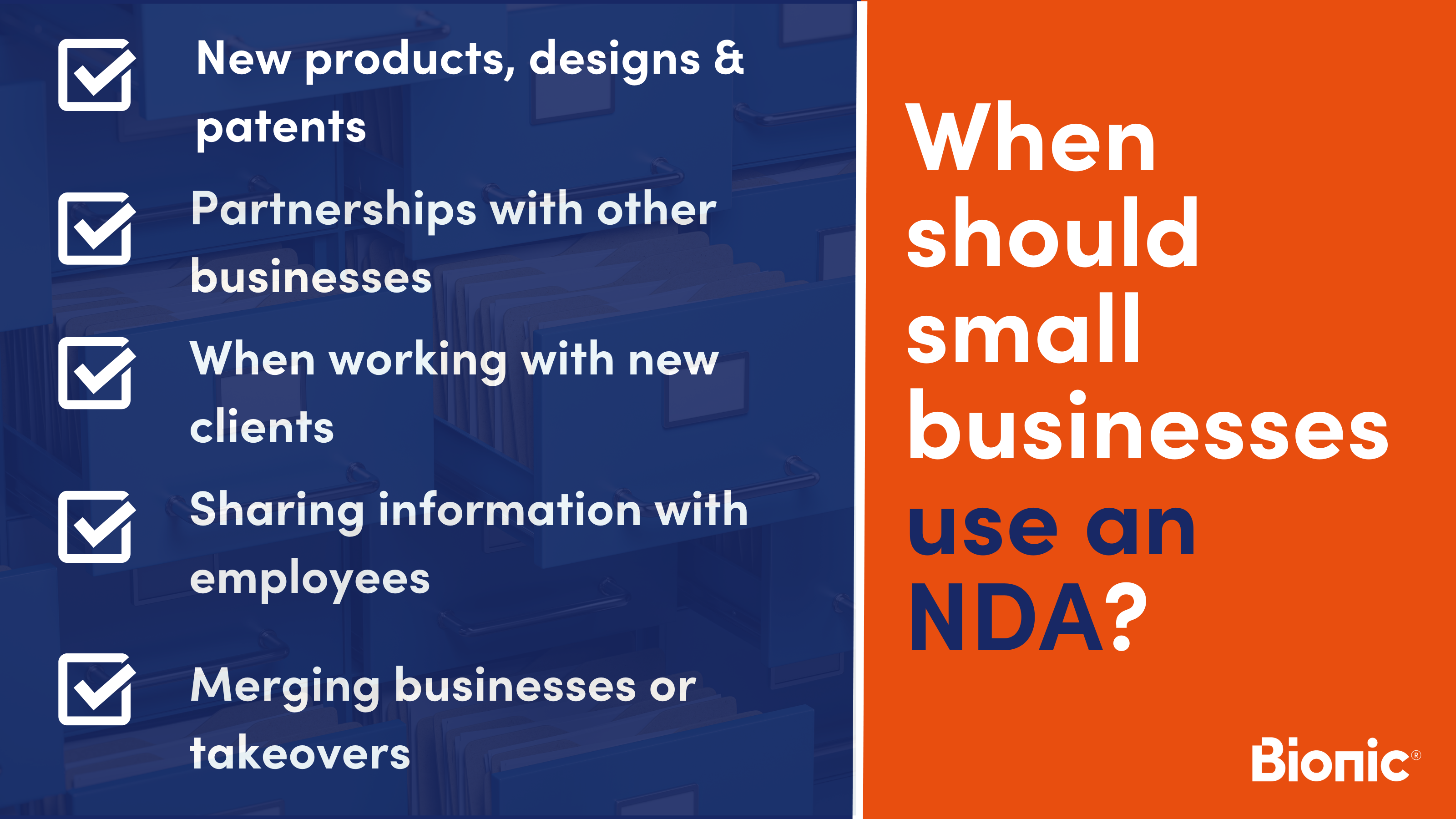What is a Non-Disclosure Agreement (NDA) and when do small businesses need one?
NDAs can get a bad rep. Businesses of all sizes use them, but some misuse them to cover up unlawful business practices and wrongly silence employees. In fact — the non-profit organisation — Speak Out Revolution has an online, open dashboard that shows 27% of employees are silenced through NDAs. Although we don’t know the full extent of how they are used in the UK, we know they are intended to be used for ethical business practices.
But before we get bogged down in all that legalise, let’s go back to the NDA basics.
What is an NDA?
An NDA (Non-Disclosure Agreement) is a legal agreement between two or more parties designed to protect confidential information from falling into the wrong hands. Think of it as a secret between two businesses, whether it’s a new partnership or even a new product.
For example, you’ve just bought a competitor’s mechanics business, but you aren’t allowed to talk about it until all the contracts and formalities have been dealt with legally. Under an NDA, you legally must keep quiet.

How do Non-Disclosure Agreements work?
An NDA helps to keep your business agreements safe. This is because the agreement clearly outlines what can and cannot be shared (or disclosed) and what happens if you do break the contract. Clear consequences for breaching the contract help to keep it under wraps.
What is the purpose of an NDA?
The purpose of an NDA is to protect sensitive information from being given, shown, shared or disclosed to unwanted parties. This applies to whether it's a new technology, a client list, or even new, exciting business plans.
Whatever it is, an NDA is a verbal agreement to keep the information under wraps until the NDA ends, but sometimes they don’t end and the information needs to always be kept secret. NDAs can help build trust with business partners, suppliers and even stakeholders.
What Can NDAs Cover?
NDAs can cover a wide range of confidential information, including:
- Products - Protecting new products, designs, and processes from your competitors, keeping them from taking your ideas.
- Partners - When you partner with a new business, supplier or contractor — an NDA can keep this news quiet.
- Employees - Keeping information shared with employees, contractors, or consultants safe.
- New Clients - When working with new clients, if you share sensitive information, supplier lists, contract terms or pricing — this can be kept secret with an NDA.
- Merging businesses or takeovers - If you’re buying or merging with another company, you might want to protect this information, especially if it contains financial information or strategic plans.
What types of businesses need Non-Disclosure Agreements?
Businesses of all shapes and sizes might benefit from having an NDA in place.
- Startups - Companies who are just getting started with a unique product, new designs or a strategy that they want to keep under wraps from competitors.
- Small Businesses - Small businesses or microbusinesses who want to keep trade secrets, partnerships or sensitive information on the down low. NDAs can be used for suppliers, employees or partners within the business.
- Technology and Software - Technology businesses that own the intellectual property rights to new code, platforms or software and want to protect it. For example, a website development company owns their own platform that they use for client websites.
- Manufacturing - Manufacturers who want to keep processes a secret to stop people from copying them. This could include information on manufacturing methods, suppliers or even distribution methods.
- Hospitality - To keep a step ahead of competitors, hospitality businesses may wish to keep secret recipes, formulas or concoctions under wraps to stop competitors from stealing and replicating their recipes.
- Marketing and Advertisement - Many agencies with client strategies, branding concepts, and advertising campaigns use NDAs to protect their creative assets and keep trusting client relationships.
- Legal and Professional Services - Businesses like law firms, consulting agencies, and professional services use NDAs to keep client information confidential and protect sensitive information.
What types of NDAs are there?
There are three main types of NDA:
- One way — This is where one party (or business) shares confidential information with the other party. These are most commonly used in everyday business.
- Mutal — These are two-way NDAs, so two parties share confidential information. In this case, both parties can decide how the other party will use or share their information.
- Multiparty — This is where three or more parties are involved, and at least one will share confidential information with the others. These are often used in complex business deals where there is a lot of negotiation — a complex confidentiality agreement, for example.
What do you need to include in an NDA?
When you make an NDA, it’s important to get all the details and terms clear, so there is no room for debate if the contract is broken. When drafting an NDA, consider including these details:
- Name who is involved — Clearly name the parties (or businesses) involved and who they are, including employees, partners, clients or suppliers, for example.
- Specify confidential information — Make sure you’ve defined what the confidential information is, so everyone is clear on what can and cannot be shared.
- Outline who is responsible for what — Assign responsibilities to all the parties involved in the agreement and state what the receiving party can’t do once the information covered by the NDA is agreed.
- Say why it’s being shared — Clearly state the purpose for sharing the confidential information and its uses by all parties. It could be that you have to share this information to carry out your intended business with a supplier or wholesaler, for example.
- Define the length of the agreement —You’ll need to outline how long the agreement will last, that is, if it ends at all. All parties will have to keep to the agreement for the duration set out in the contract. Sometimes there are even post-agreement rules.
- For example, as a business owner of a series of takeaways, you may wish for an employee to sign an NDA to keep business matters private. This agreement may be in place for as long as they are employed but also if they leave the business because the information could be damaging if leaked or given to competitors.
- Write down the consequences of a breach — Include details of what happens if someone breaches the NDA. This could be from leaking information or sending private files, for example. The consequences could include any legal action or even financial penalties to either party.
- Agree on how to dispose of the agreement — Once the agreement has ended, you may want to get rid of all evidence of it, especially if it contains confidential or sensitive information. Most businesses do this by shredding it and putting it in a confidential waste bin.
- Clearly outline any exceptions - In some cases, there might be exceptions to the agreement. This could be because the information is widely known, and it isn’t possible to keep it confidential.
Are there any limitations to using an NDA?
If NDAs are used properly, they are great for protecting private business information, but they also have their limitations and potential drawbacks. Here are a few:
Reputation Risks
If you ask a stakeholder or employee to sign an NDA, it may come across as secretive and distrustful, especially if you are asking them to hide information from other employees or keep quiet about wrongdoing on your behalf. And even if they leave the company, this still could potentially damage your business's reputation.
Protection is timebound
Some NDAs provide protection only for the time specified in the agreement — this leaves sensitive information vulnerable after the agreement expires unless it specifically states the information can never be shared!
International challenges
Getting someone to sign an NDA across an international border can be difficult because of differences in legal systems and regulations. This makes creating the NDA a lot harder, and you might need some legal help to get the small details right.
When would employees be asked to sign an NDA?
In some cases, you might want your employees to sign an NDA as part of their contract, especially if they have access to trade secrets or sensitive information like settlement amounts for private deals, for example.
But, business owners shouldn’t ask employees to sign NDAs to hide any illegal activity. If this were to happen, a whistleblowing policy should be in place to help ensure employee safety.
What's the difference between an NDA and a confidentiality agreement?
The main difference between an NDA and a confidentiality agreement is that NDAs are normally around sharing confidential business information between the parties.
Confidentiality agreements may include more personal information like data, including personal details of employees or clients, for example.
What are the consequences of breaking an NDA?
The consequences of breaching an NDA can be bad for business and may include:
Legal action
If you sign an NDA with another business and have a dispute about breaking it, don’t be surprised if legal action comes your way. It’s a good idea to have proper business insurance policies in place in case to provide a buffer against the claim. You could face legal action or even thousands to pay in fines or damages, not to mention hefty lawyer fees on top.
Firing employees
If an employee of yours breaks an NDA under the contractual terms, your employee may have to face disciplinary action or even be fired. Always make sure your employees understand what they’re signing. Or, if your small business is stated in the NDA and you share information with your employees, make sure they know they are bound by the terms of the NDA and do not share the information with anyone!
Large penalties
In most cases, breaking an NDA isn’t a crime, but it is still a contract, and this means the “breaching party” may have to pay a hefty sum to the other as specified. Even worse, you can also end up with legal costs to pay if the dispute ends up in court.
Criminal charges
In extreme cases, NDA violations may result in criminal charges for theft of trade secrets or intellectual property. In these cases, you could be looking at paying hefty fines in compensation, legal costs and criminal charges — and this could be enough to cripple most small business owners in the UK!
Protecting your people with Bionic
If your employees make a mistake or slip up, it’s best to make sure your business is covered against the unexpected. Bionic can do the hard work and help you sort out the right Business Insurance for your needs. We talk your language and won't waste your time, working with you to just find the right policies you need, with no unnecessary extras. Get a quote for your business today.
Interested in more content from us? Explore our business insurance guides for practical guides, from health and safety in your workplace to understanding GDPR and everything in between.








